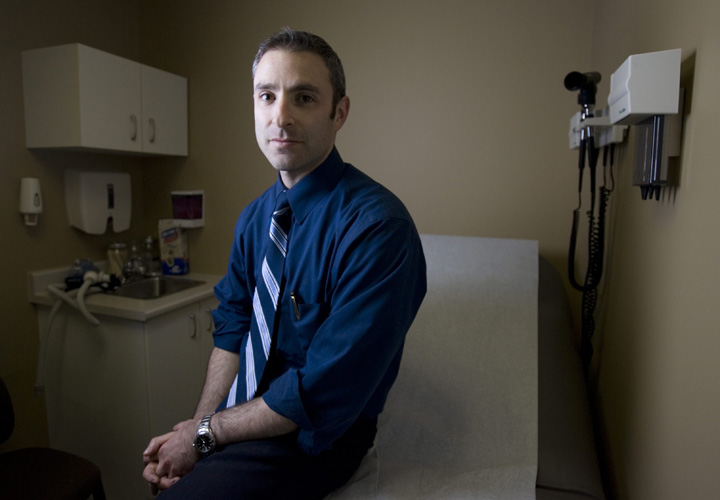TORONTO – Dr. Yoni Freedhoff had been studying obesity and treating patients for years when he had his eureka moment.

His weight loss patients were progressing well, but they weren’t exactly satisfied with their diets. Yes, they’d drop a few pant sizes but it wasn’t always long-lasting.
Freedhoff, one of North America’s leading weight management experts, realized his patients had something missing: chocolate. That’s when he decided to work in a daily dose of the sweet stuff.
That was nine years ago. Now, the Ottawa-based doctor is sharing his insight on why dieting is always short-lived in his new book The Diet Fix: Why diets fail and how to make yours work.
READ MORE: Health Check approval misleading consumers, Canadian doctor alleges
Global News asked him about how dieting has morphed into a psychological ailment, why we keep torturing ourselves and how chocolate and treats fit into our daily lives.
Global News: You talk about the seven deadly sins of dieting – being hungry, sacrifice, white-knuckle willpower. Why do we back ourselves into this corner with these sins? And why do we keep taking this same route even though it gets up back to the same point?
Freedhoff: Those sins are what society teaches as the requirements to success. That if you want to lose weight you need to want it badly enough to go hungry, to give up foods you love, and to go on black-garbage-bag-cupboard-cleaning binges of junky (but often delicious) foods. Society is also taught that if you can’t do those things forever it’s because you personally failed rather than your diet. You just didn’t have enough “willpower.” Sadly, as long as people believe those sins are the required ingredients of success they’ll keep going back to the pot periodically for more.
- Trudeau tight-lipped on potential U.S. TikTok ban as key bill passes
- Canadian man dies during Texas Ironman event. His widow wants answers as to why
- Hundreds mourn 16-year-old Halifax homicide victim: ‘The youth are feeling it’
- On the ‘frontline’: Toronto-area residents hiring security firms to fight auto theft
Global News: You realized you had to make a change to make weight loss in your clinics sustainable. Why was adding chocolate such a game changer?
Freedhoff: Adding chocolate was just one piece in an overarching change in my philosophy surrounding weight management which in turn was my shift from thinking that BMI or other measures (waist to hip ratios, body fat percentiles) were useful. Instead, I embraced a concept that I call “best weight,” where a person’s “best” weight is whatever weight a person reaches living the healthiest life that they honestly enjoy, and for most, that life will indeed include chocolate. Freeing patients from believing that the scale was their arbiter of success and explicitly reminding people that food isn’t simply fuel but also plays real roles in comfort and celebration enabled them a great deal more success in sustainable, long-term, change.
READ MORE: How much sugar is in Nutella? Canadian doctor decodes what’s in the hazelnut spread
Global News: With adults, we’re taught that suffering and traumatic dieting works. What do you want people to understand about obesity?
Freedhoff: That it’s not a choice, that people truly don’t choose to gain weight, that the world hasn’t seen an epidemic loss of willpower over the course of the past 80 years. People haven’t changed, the world around us has, and in this world the default is weight gain as weight gain is the very natural consequence of genes forged over hundreds of millions of years of dietary insecurity living in an environment that relentlessly pushes highly indulgent food at us at every turn. That doesn’t mean we can’t do anything about it, but it does mean that it’s not laziness that’s got us here.
Global News: What are our most common misconceptions about weight?
Freedhoff: The most common misconception out there about weight is that its presence or absence measures health. Even health professionals fall into the trap of believing that scales measure whether or not we’re healthy, and yet I know plenty of skinny people living horribly unhealthy lives, and plenty of folks with weight to lose with lifestyles that put mine to shame health wise. To suggest that everyone of a particular height ought to strive to weigh the same amount is nonsense – and it ignores reality. Genes, co-existing medical problems, socio-economics, medications, primary caregiving, shift work, travel and more – all of these (and many more) will have a bearing on weight and yet none are changeable.
READ MORE: Year in review – 10 health and nutrition stories of the year
Global News: What is the single biggest mistake people make with their diets? What are the best things people can do starting today to try to turn their health and weight around?
Freedhoff: The biggest mistake people make with their diets and lifestyles is overcomplicating them. Cook from fresh whole ingredients as often as you can. Exercise as much as you can enjoy but not more. Brown bag lunch. Eat out for special occasions only. Really try to decrease the liquid calories and use a food diary to figure out what you’re actually eating. Do those things and I’ve no doubt, those strategies alone will give you a great leg up on improving your health.
carmen.chai@globalnews.ca
Follow @Carmen_Chai



Comments